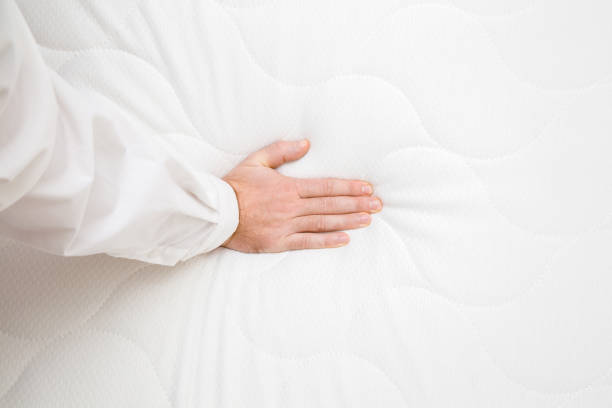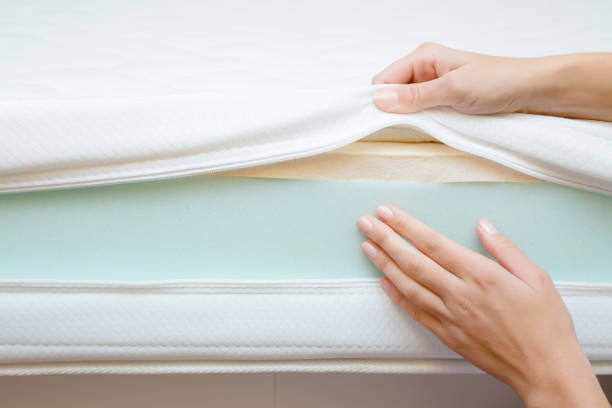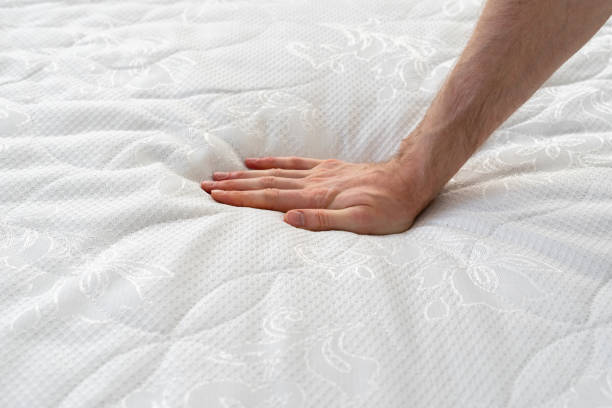Introduction

Foam mattresses enhance comfort and quality sleep for individuals with Parkinson's disease. As the symptoms of Parkinson's can significantly impact sleep patterns and overall well-being, finding the right mattress becomes crucial.
This blog post highlights the advantages of foam mattresses designed specifically for individuals with Parkinson's disease. It will cover the various features, benefits, and considerations that cater to the specific requirements of this group. Whether you're a patient, caregiver, or healthcare professional, join us as we unravel all there is to know about foam mattresses and how they can contribute to a restful night's sleep for individuals with Parkinson's.
What Is a Foam Mattress?
A foam mattress is a bed made of polyurethane foam that can offer extra cushioning and support to people with conditions that impact their mobility, such as Parkinson's disease. The foam mattresses' design aims to conform to the body's shape to relieve pressure points and reduce discomfort. They are also made to be breathable, enabling the sleeper to remain cool and comfortable throughout the night.
How Foam Mattresses Can Help with Parkinson's Symptoms

As anyone with Parkinson's knows, the symptoms of the disease can be very disruptive to sleep and comfort. Fortunately, foam mattresses can help relieve some of those symptoms. Foam mattresses provide superior support to help reduce pressure on stiff joints and muscles, improving overall comfort for people with Parkinson's.
The medium-firm surface of the mattress contours to your body while providing optimal support. This helps promote better circulation and reduces nighttime restlessness, enabling you to get a better night's sleep. Additionally, foam mattresses are also temperature-regulating, helping to keep you cool during the night and reducing opportunities for nighttime sweating or overheating.
Foam mattresses reduce the movement felt on one side of the bed by absorbing the motion rather than transferring it to the other. This feature can be particularly useful for couples with different sleep schedules because of Parkinson's. All these benefits make a foam mattress an ideal choice for those with Parkinson's disease looking for improved sleep and better overall comfort.
Benefits of a Foam Mattress for Parkinson's Patients

Foam mattresses benefit those who have Parkinson's disease because they provide comfort, support, and pressure relief. Foam mattresses offer several advantages that are particularly helpful for individuals with Parkinson's disease.
Comfort:
Foam mattresses provide a comfortable sleeping experience for Parkinson's patients. The mattress's soft surface helps ease muscle tension and minimize pain associated with nighttime movements. The foam layer is also contoured to support the body in its natural position, giving added comfort throughout the night. Foam mattresses also feature temperature-regulating technology that helps to keep the body at a consistent, comfortable temperature throughout the night. This prevents excessive sweating and discomfort during sleep.
The pressure-relieving properties of a foam mattress are also beneficial for those with Parkinson's. The foam's open cell structure disperses pressure points, allowing the spine to stay in its natural position and reducing areas of discomfort. This helps ease Parkinson's pain and enhance overall body circulation during sleep.
Support:
A foam mattress provides excellent support for Parkinson's patients. The contoured surface of the foam helps to ensure that the body is held in the correct position while sleeping, reducing any pressure points and helping to reduce pain. Additionally, a thicker layer of foam helps to provide increased spinal support and ensures that no part of your body is left unsupported during the night.
A foam mattress's contouring also helps reduce tossing and turning throughout the night. This can help minimize sleep disruption, allowing those suffering from Parkinson's to get a restful night's sleep. Additionally, foam mattresses' supportive nature helps keep the sleeping area level and prevents gaps between the mattress and the bed frame. This helps to reduce any discomfort that can occur from movement during the night.
Ultimately, a foam mattress is an excellent option for those with Parkinson's disease. Comfort, support, and pressure-relieving properties make it an ideal choice for improving sleep quality. With the right mattress, Parkinson's patients can look forward to a more restful night's sleep.
Pressure Relief:
Foam mattresses help to evenly distribute body weight, reducing pressure points on the body which can worsen the pain and discomfort caused by Parkinson's. The mattress's contoured shape also helps reduce pressure in areas such as the hips and shoulders. This can improve sleep quality by reducing the pain caused by movements at night.
The material used in foam mattresses is also beneficial for relieving pressure points. Memory foam, for example, is designed to mold to the body's shape and provide support in areas where pressure points can occur. Certain foam mattresses also feature cooling gel technology that helps reduce heat buildup, which can cause discomfort during sleep. Different types of foam will be easier or more difficult to move on for position changes. It is recommended to assess a few types to see which one best meets the need for comfort and mobility. Moving with greater ease encourages more frequent position changes which reduces overall pain and stiffness.
In addition to providing comfort and support, foam mattresses are also beneficial for those suffering from Parkinson's because they help to reduce pressure points. The foam's open cell structure helps to evenly distribute body weight, resulting in less pain and discomfort during sleep. With the right mattress, Parkinson's patients can look forward to a more restful night's sleep.
Types of Foam Used in Mattresses for Patients with Parkinson's Disease
When looking for a mattress that is designed specifically for those with Parkinson's disease, there are certain types of foam that you should look for. For those with Parkinson's, memory foam is a popular type of foam used in mattresses. It is designed to mold to the body's shape and provide support in areas where pressure points can occur. Though memory foam may feel more supportive, it can make moving more difficult because the body sinks into it. If this is a problem, using friction-reducing sheets and sleepwear can help to counteract the increased resistance to moving that memory foam presents to some users.
Some mattresses also feature cooling gel technology that helps reduce heat buildup, which can cause discomfort during sleep. This type of foam is especially beneficial for those with Parkinson's who may experience night sweats or have difficulty regulating their body temperature.
Another type of foam often used in mattresses for Parkinson's patients is hybrid foam. Hybrid foam combines memory and support layers to improve comfort and pressure relief. Combining these two types of foam helps reduce movement transfer, allowing you to sleep better without disruption from your partner or other sources.
Ultimately, various foam types are used in mattresses for Parkinson's patients. Researching and finding the type that best fits your needs is important. With the right mattress, those with Parkinson's can look forward to improved sleep and better overall comfort.
What Else Should I Consider When Shopping For a Mattress?
Choosing the right type of mattress is crucial for someone with Parkinson's disease. It should be supportive, comfortable, and tailored to the patient's needs. When shopping for a foam mattress designed specifically for Parkinson's patients, you will want to consider the following:
Firmness: Your mattress should provide sufficient support without being too stiff, as stiffness can cause aches and pains. If you're searching for a mattress, look for one that provides medium to firm support, with added softer cushioning in certain areas to alleviate pressure.
Temperature Regulation: Many Parkinson's patients have difficulty regulating their body temperature, so finding a mattress that helps manage heat buildup is important. Memory foam mattresses are designed to help with temperature regulation, as they absorb body heat and keep the sleeping surface cool.
Motion Isolation: As Parkinson's patients tend to move around in their sleep, you must find a mattress that minimizes motion transfer between partners. Consider getting a memory foam mattress if you want good support and minimal motion disturbance. Weigh these benefits with ease of repositioning – getting in and out and turning – to find what works best for you.
Considering these factors will increase your chances of finding a suitable mattress for your Parkinson's patient that offers comfort and support while sleeping.
FAQ's
What is the best mattress for someone with Parkinson's disease?
The best mattress for someone with Parkinson's disease is one that offers ease of mobility, support and comfort without being too stiff. Look for a mattress with medium to firm support, as well as some areas of softer cushioning. Memory foam mattresses are often a great choice for those with Parkinson's due to their temperature-regulating properties and motion-isolation capabilities. Be sure to consider and trial a few types before choosing one.
What is the best bedding for Parkinson's patients?
The best bedding for Parkinson's patients should provide support, ease of mobility and comfort. Look for materials that are breathable, temperature-regulating, and hypoallergenic. Opting for mattresses featuring memory foam layers is recommended for better motion isolation and relief from pressure. Also, choosing bedding that suits the person's size and needs is important to help ensure their optimal comfort.
How can I improve my sleep quality with Parkinson's?
Improving your sleep quality with Parkinson's starts with finding the right mattress, sheets and sleepwear. These are the main items in direct or close contact with your body and are thus critical for consideration. Look for this grouping of items to provide optimal levels of support, ease of mobility and comfort.
What is the best furniture for Parkinson's patients?
When selecting furniture for someone with Parkinson's, look for pieces designed to provide them with support, comfort and ease of use. Ensure the furniture is ergonomically designed and tailored to the user's needs. This can help improve their comfort and ability to move with greater safety, independence and freedom.
How do you make someone with Parkinson's more comfortable?
Making someone with Parkinson's more comfortable can start with creating a comfortable and supportive sleeping environment. Using sheets and sleepwear that make moving easier by minimizing friction during repositioning actions can help improve comfort and independence. The added comfort of moving with less exertion helps the body to relax and rest. Look for mattresses specifically designed for those with Parkinson's, such as memory foam or hybrid foam mattresses. All furniture should be tailored to the user's needs.
What accessories help with Parkinson's?
Accessories are available that can assist with Parkinson's. Look for memory foam pillows or orthopedic mattresses that provide superior support and comfort. Additionally, consider items such as friction-reducing sheets and sleepwear sets that promote greater mobility and better sleep. Finally, look for products designed specifically for those with Parkinson's, such as special footwear or utensils that can make everyday activities easier.
Conclusion
I hope this article has provided a better understanding of the foam mattresses and bedding options available for individuals with Parkinson's. With the right mattress, those with Parkinson's can look forward to improved sleep and better overall comfort. It is important to consider furniture personalized to the user's needs and accessories, such as memory foam pillows, orthopedic mattresses, and sets of friction-reducing sheets and sleepwear. Better sleep can assist in making daily tasks and activities more manageable. By researching and finding the right mattress and bedding for Parkinson's patients, you can help ensure they are comfortable and supported while they sleep.

